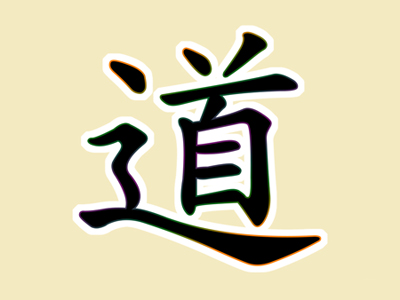
The central aim in Taoism is to follow the "Tao", a word which roughly translates as "The Way". Taoists believe in following life in its natural flow, what they refer to as an "effortless action".
Taoists regard Tao and De (power, virtue, integrity) as the general principles of their beliefs and behavior. They should not only cultivate Tao but also accumulate De. Therefore, both Tao and De serve as the basis of Taoist doctrines. Derived from the foundation of Tao and De are a whole set of principles, including non-action, non-passion and non-desire, non-struggle, and the pursuit of simplicity and truth.
Worship of Tao and De
De is the highest embodiment of Tao. Tao is the origin of all creations while De is the active living, or cultivation, of that "way" (Tao). People worship the deities for their noble virtue. Tao and De act as a whole because De is the active expression of Tao. Taoists should improve self-cultivation and possess good moral quality.
Pursuit of Longevity and Immortality
Taoism believes that the gods in heaven live an immortal life, which is the highest ideal of a Taoist. To achieve this goal, one must practice Taoism both inside and outside one's physical existence. Thus, Taoism advocates a positive and unworldly attitude towards life. Human life is derived from the qi of nature (life-process, flow of energy), so we should cherish and enjoy our life, eventually merging life into Tao.
Purity and Tranquility
Purity and tranquility, corresponding to turbidity and movement, is the standard of behavior for Taoists. Purity is the source of turbidity while movement is the root of tranquility. This reciprocal relationship is a full manifestation of the purity and tranquility in Tao. As the origin of the universe, Tao governs the development of all creations by its nature of purity and tranquility. Taoists never ask for reward or gain. They are detached from desire for anything. If the human society is governed in the spirit of purity and tranquility, the world will achieve the status of harmony and the humans’life will get ascended.
Wu Wei
Wu wei is a central concept in Taoism. The literal meaning of wu wei is "without action". It is often expressed by the paradox wei wu wei, meaning "action without action" or "effortless doing". The goal of wu wei is in alignment with Tao, revealing the soft and invisible power within all things. It is believed by Taoists that the masters of wu wei can observe and follow this invisible potential, the innate in-action of the Way.
The universe works harmoniously according to its own ways. When someone exerts their will against the world, they disrupt that harmony. Taoism does not identify one's will as the root problem. Rather, it asserts that one must place their will in harmony with the natural universe. Thus, a potentially harmful interference is to be avoided, and in this way, goals can be achieved effortlessly.
Soft Attitude to Life
According to Laozi, the soft can conquer the hard and the weak can beat the strong. In Taoism, the spirit of "being soft" is embodied in the following two aspects:
1. Softness is the spiritual essence of life. All the living things in nature are soft in their own ways. Only the dead are rigid. In the pursuit of longevity, people should maintain their softness by keeping a peaceful mind.
2. Softness represents a positive attitude towards life. Taoism is against too much strength in action in that the strong tend to break first. Taoists should learn from the soft power of water which can wear away the rock and cultivate themselves in a positive life attitude.
Returning to Pu
Pu is translated "uncarved block", "unhewn log", or "simplicity". It represents a passive state of receptiveness. Pu is a symbol for a state of pure potential and perception without prejudice. In this state, Taoists believe everything is seen as it is, without preconceptions or illusion. Pu is usually seen as keeping oneself in the primordial state of Tao. It is believed to be the true nature of the mind, unburdened by knowledge or experiences. In the state of pu, there is no right or wrong, beautiful or ugly. There is only pure experience, or awareness, free from learned labels and definitions. It is this state of being that is the goal of following wu wei.
Unity of Nature and Humanity
In Taoism, man is seen as an integral part of nature. However, the man-made decrees and regulations deprive the natural disposition of man, thus man becoming inharmonious with nature. We should break down the barriers and free our mind to achieve the spiritual state of being harmonious with all creations on earth.
Cycle of Nature
Taoism believes that everything is cyclic in nature and all deeds will get corresponding retribution. It means that the evil deeds will do great harm to later generations while the good deeds will benefit them. We should behave in observance of Tao and do good deeds and help others so as to acquire more merit and virtue.
Dual Cultivation of Mind and Body
Both mind and body are indispensible parts of man’s existence. On the one hand, a healthy body lays physical foundation for man’s living in the world. If the body is dead, we will lose our life. On the other hand, we cannot live without mind. It is the spiritual consciousness that distinguishes man from other animals. Taoism regards man as the unity of mind and body, thus one must practice Taoism both inside and outside one's physical existence. Inner practice involves physical and breathing exercises, and concentrated contemplation. External practice involves doing good deeds and helping others so as to acquire more merit and virtue. The basic principle of this practice is to cultivate the self both spiritually and physically.